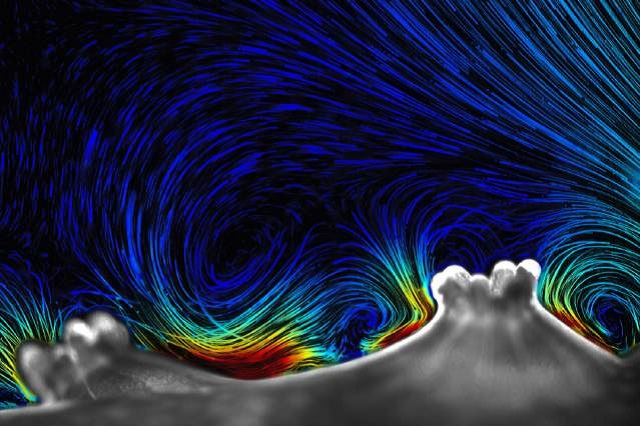 Image Credit - MIT - Vortical ciliary flows enhance the exchange of oxygen and nutrients between corals and their environment. The paths of tracer particles are color-coded by fluid velocity, demonstrating that the coral surface is driving the flow. Courtesy of the researchers
Image Credit - MIT - Vortical ciliary flows enhance the exchange of oxygen and nutrients between corals and their environment. The paths of tracer particles are color-coded by fluid velocity, demonstrating that the coral surface is driving the flow. Courtesy of the researchers
Scientists at MIT, in collaboration with the Weizmann Institute of Science in Israel have discovered that corals are not as passive as previously thought. The team have found that corals manipulate their environment to force water into turbulent patterns which enables them to exchange nutrients and dissolved gases with their surroundings.
The team found that the coral organisms possess minuscule threadlike appendages or cilia that they use to produce complex turbulent flows of water to bring in nutrients.
It was widely thought that corals used their cilia to push water along their surface in a smooth manner so they could remove sediments, but would have minimal impact on dissolved nutrient exchange.
MIT associate professor of civil and environmental engineering, Roman Stocker, states that the microenvironmental processes were a surprise, but were very important.
The researchers studied living coral reefs in the lab. They observed the coral surface with high-speed video cameras and powerful microscopes. The microworld near the coral surface was found to be very violent. The researchers discovered that the cilia on the surface of the corals were arranged in a unique way that caused strong swirls of water, which attracted nutrients towards the coral. The cilia were also used to increase dissolved molecule exchange and drive away excess oxygen and other such toxic products.
The general thinking has been that corals are completely dependent upon ambient flow, from tides and turbulence, to enable them to overcome diffusion limitation and facilitate the efficient supply of nutrients and the disposal of dissolved waste products.
Orr Shapiro, a postdoc from WIS and co-first author on the paper
Corals as engineers
Researchers show how corals actively engineer their environment to filter nutrients towards the surface and waste products away. (Melanie Gonick/MIT)
The researchers analyzed six different species of reef corals and they found that all of them had the same ability to stir up water eddies.
This study may help scientists better understand how climate change impacts the health of the coral reefs.
The National Science Foundation, the Human Frontiers in Science Program, the Gordon and Betty Moore Foundation and the National Institutes of Health have supported this study.
The results of the study have been published in the Proceedings of the National Academy of Sciences.
References